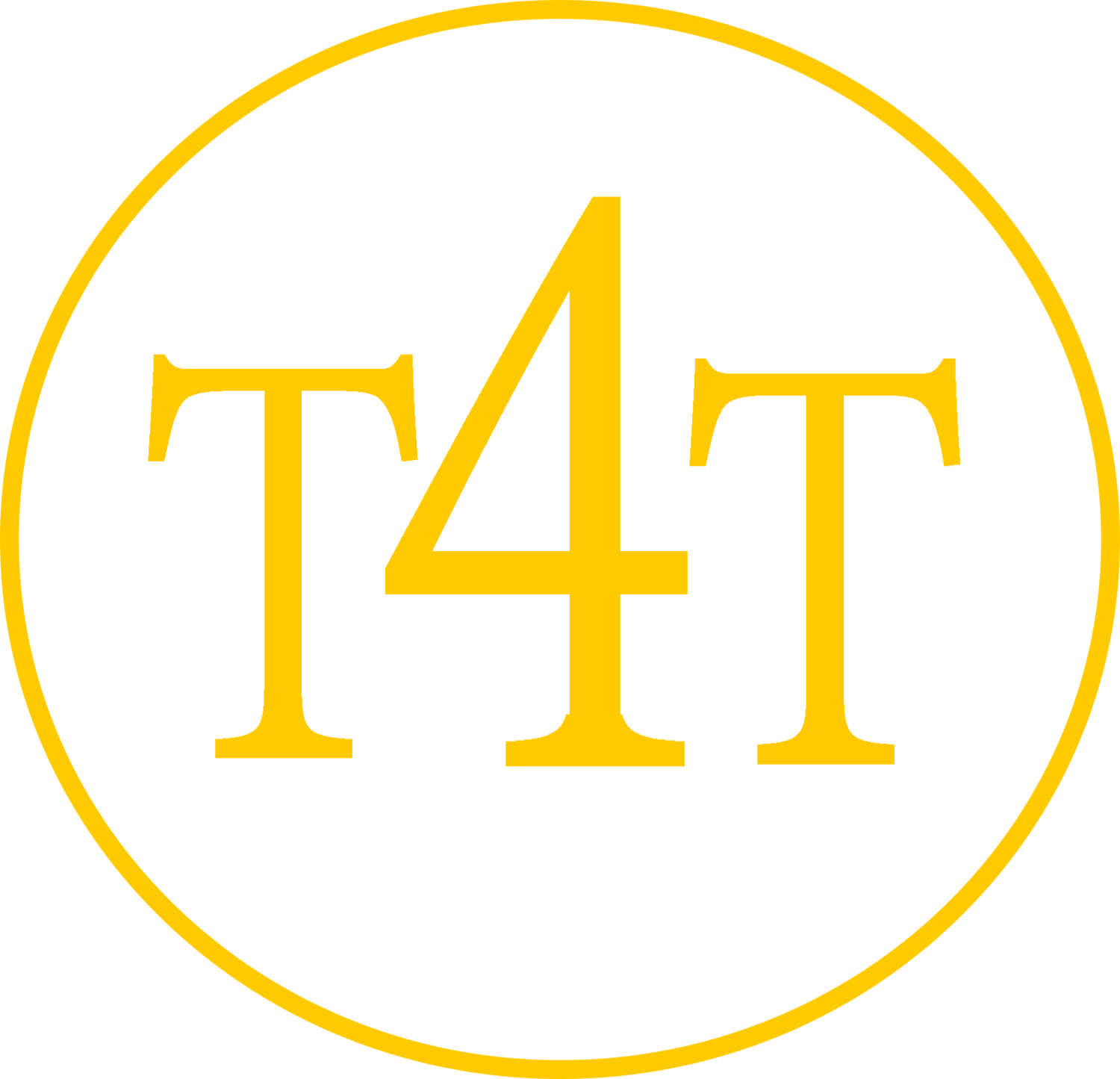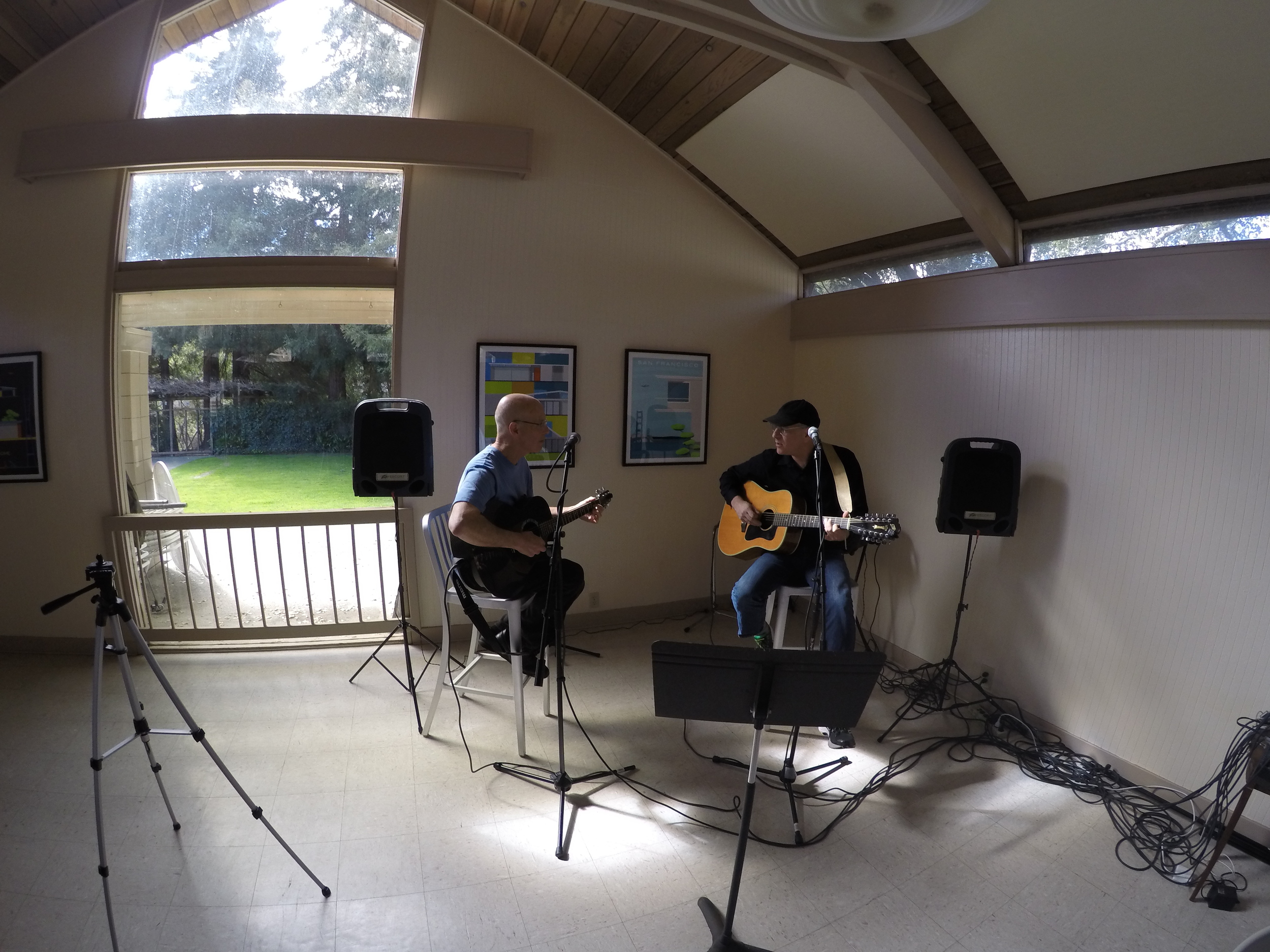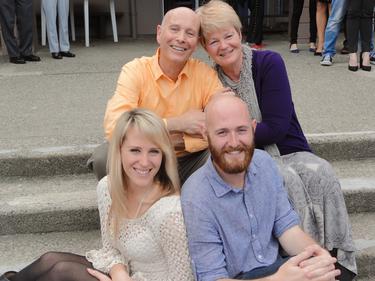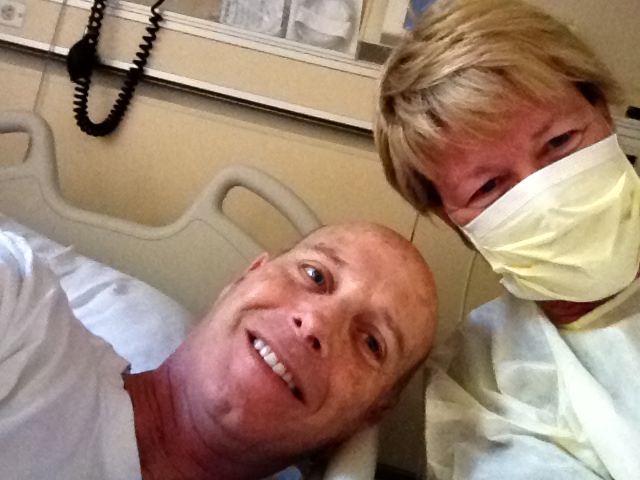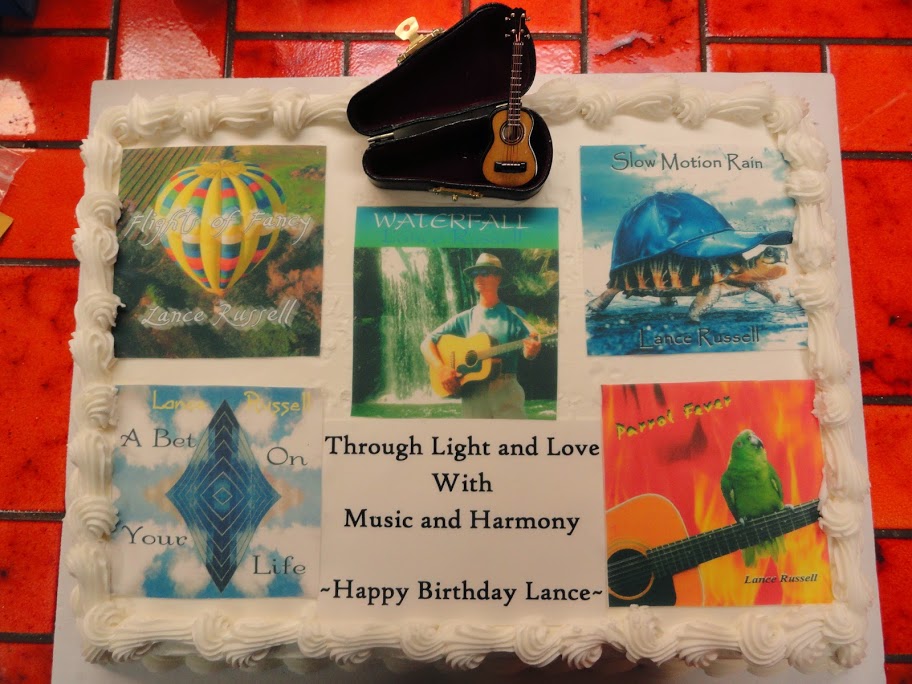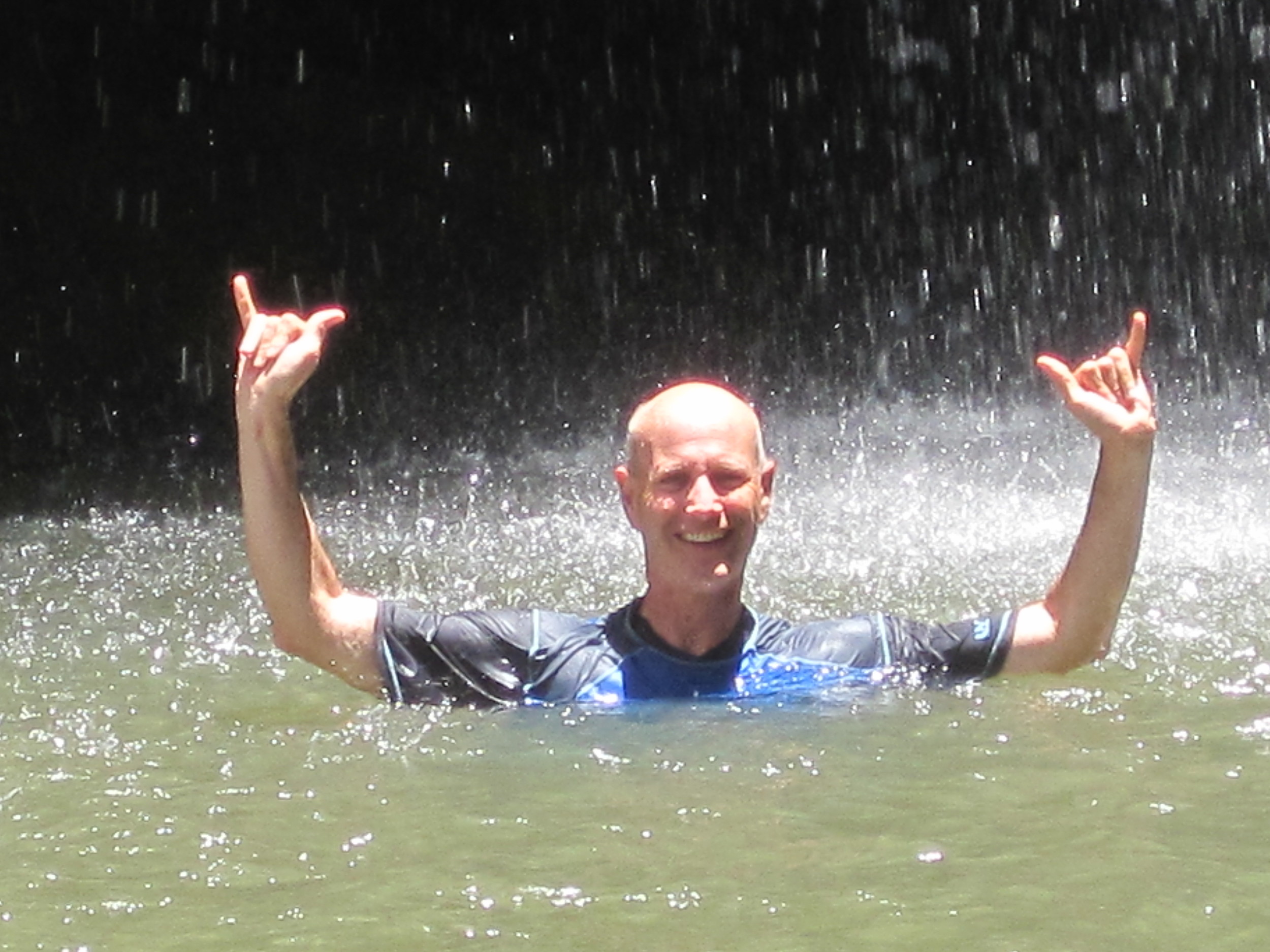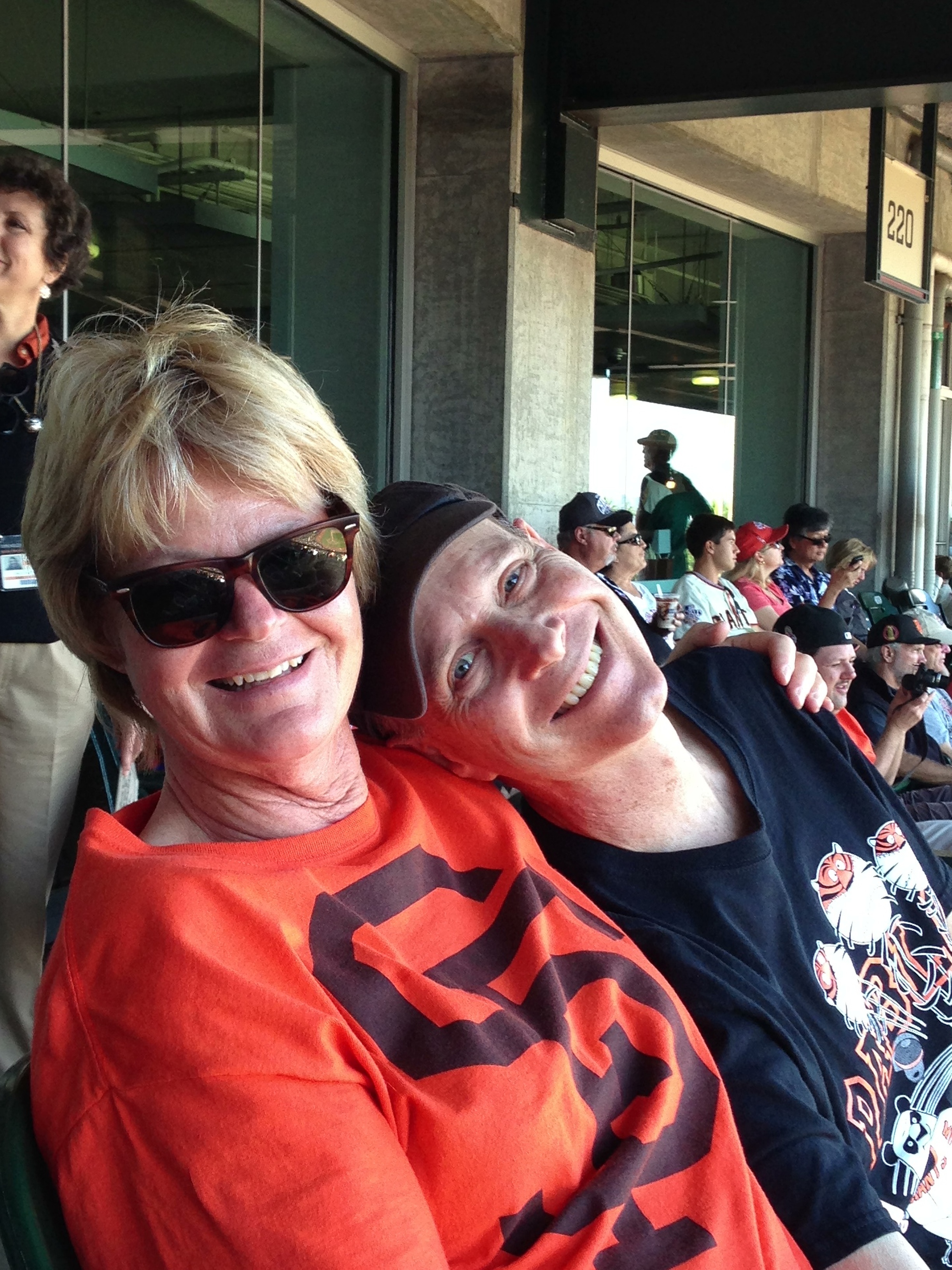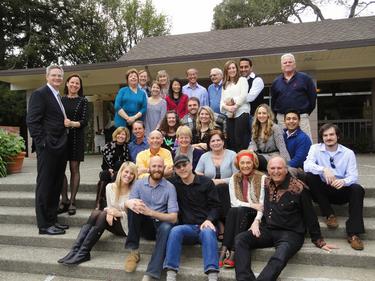SONGS IN THE KEY OF
SURVIVAL
MY STORY
“I GOT THE NEWS TODAY, OH BOY”
I heard the words, and my first sensation was complete numbness. Then I heard the words again.
"I am sorry, but I have some bad news."
If only it ended there, but it didn’t. Then the dagger cut right through to my heart.
"You have cancer."
The numbness bled into disbelief -- then shock -- then fear.
I AM GOING TO DIE! Without any idea what I had done, I had been found guilty and sentenced to the ultimate punishment. In the course of fifteen seconds, the life I had known, the life I had worked so long and hard to create, was gone and would not return.
In silence, I kept hearing my own voice asking, "Why me?" "What have I done to deserve this?" My wife -- my children-- what have they done to deserve this? There must be a cause. There must be an explanation. There must be a reason why I have been struck down with such vengeance.
What were the signs? Why didn't I realize what was happening sooner? How could I have been so indifferent to my own survival? How could I have let this happen?
On and on it went. Questions upon questions with no answers. Finally, when the weight of fear and exhaustion brought me to my knees, I realized that it didn’t matter why. The cancer was there and I had no choice but to deal with it.
What would I do now?
Still reacting with my rational mind, I searched for information. I soon discovered that in my present state, I was too distraught to understand my medical situation. Large cell, small cell, fast growing, follicular, type A, type B, stage 3, stage 4 -- it all became a tangled web of incomprehensible information.
What did strike a chord were the words that related to treatment -- chemotherapy, bone marrow transplant, radiation, surgery. I did not know what they meant, but I did know what they signified. I was about to embark on a journey that would take me to places that I had never been before -- places that would test my threshold of pain, my worst fears and ultimately, my will to live.
Nighttime fell on the longest day of my life.
With no guarantees that treatment would be successful, and after having been told that I had about a 15% chance of surviving a year, I faced the uncertainty of the journey that lay ahead. If statistically I had only a 15% chance of survival, then I would face the future in one of two ways. Since I am a unique individual and statistics only measure data about other people, they did not apply to me. Alternatively, if there was a 15% survival rate, then someone had to be part of that group and why not me.
Three days after being diagnosed, I had an epiphany that became the foundation for my path to healing. I confronted the cancer and proclaimed to myself that while it could ravage my physical body, it could not and would not attack my heart, my soul and my creative inspiration. That was mine, and mine alone.
I embarked on a journey of not just a recovery, but a rebirth. If I survived all the treatment, I was not going to just resume the lifestyle I had previously known. I was going to create a new me filled with gratitude and inspired by the gift of life that is so precious and so fragile. As Bob Dylan wrote, “he not busy being born is busy dying.”
“GIMME SHELTER”
As treatment began, I realized that slowly but surely I was being stripped of my identity. What I previously took so easily for granted, the fact that each day was the end result of the choices and decisions that I made, had now become a brave new world where I was no longer in control of my own life. My day became a complex schedule of potent medicines and debilitating side effects. I was a spectator in my own life, watching from the sidelines while the battle raged on inside my body. Time, which previously had only moved forward, became static and fixed. The future, which had been an integral part of my thoughts and plans, became consumed by the present as I struggled to survive from one hour to the next.
Concerned friends, family and colleagues inquired about me. While I appreciated their good intentions and kind thoughts, the truth of the matter was that what I really wanted was solitude. Constantly talking about being sick and what I was going through wore me down physically and emotionally and exacerbated my fatigue.
Feeling helpless, I began the ordeal of major surgery, seemingly endless chemotherapy, and a bone marrow transplant that was many months away. Alone with my pen and my inspiration, I found comfort in my commitment to create a lyrical and musical legacy of my journey.
“WHAT COLOR IS YOUR SONG?”
Initially, my life rotated around so many medications that we had to post schedules throughout my house to make sure we did not lose track of what I was supposed to be taking at any given time. One of the drugs was prednisone, which in the amounts that I was taking made daily life truly miserable. I became acutely aware that I had to confront not only the physical assault on my body, but the emotional ordeal of the day to day and hour to hour effects of all the medications. As a further reminder of how different I was from the rest of the world, I only had to look at my body and see the Hickman catheter that grew out of my chest like something from “A Little Shop of Horrors.”
No matter what lay before me, cancer had changed everything. As the doctor who informed me about my diagnosis told me, “the life you knew will never be the same.” The one thing I did know was that music would be my beacon of light through the dark roads ahead.
What color was my song? Was it red, green or yellow? Or was it just going to be the blues? I would have to find out.
“WHILE MY GUITAR GENTLY WEEPS”
As my treatment progressed, I soon began to feel that I had become a burden to everyone around me. During my first transplant, and after many months of outpatient chemotherapy, I had to have my spleen removed. It was supposed to have been a relatively short and uneventful laparoscopy procedure, but ended up being major surgery. I was given so much pain medication after the surgery that one morning I woke up and I could see virtually nothing. I thought I had gone blind.
During this time, I also had to endure excruciatingly painful spinal fluid leaks resulting from tests to confirm how much of the lymphoma had infiltrated into my bone marrow. I remember an evening after one of these episodes when I seriously contemplated whether I wanted to continue to live as a total burden to my family, or whether it would be better for everyone if this ordeal just ended.
Would I anguish in being a victim, or would I rise above my misfortune to inspire myself and possibly others? Staring at pictures of my family and hearing the voices of my children, I chose to create a legacy of courage and commitment to the affirmation of life. Maybe I would survive, maybe I would not, but I was going to make my wife and my children proud of me, and with that would come the dignity that I so desperately sought for myself.
It was not going to be easy, and in my severely weakened state it would have to come one small step at a time.
“OUT ON HEAVEN’S TRAIL”
On the night of my splenectomy, I began to feel a huge surge of pain. I had a self-medicating morphine line, and in the spirit of what my doctors called “pain management”, I decided to use it. Two different nurses told me the next morning about what had occurred the night before. In all their years of practice, they had never seen anything like it.
At the time, I was completely bed ridden from the surgery and hooked up to an IV. I could barely move a few inches without excruciating pain. The idea of doing anything on my own that involved any movement was absolutely out of the question. After putting myself to sleep with morphine, I physically left my body. In an unconscious state, I ripped the IV from my arm, got out of bed, and began walking down the hall with blood dripping from my arm. I approached the nurses and asked calmly: “Where’s the celebration?”
They returned me to my room and my prior state of immobility. When I woke up the next morning I remembered none of this, but I did notice that the self-medicating morphine line had been removed, I had new bandages on my arm and the location of my IV had changed.
“THE TIMES THEY ARE A-CHANGIN”
In the face of all the negative consequences that consumed me and my family, I came to realize that there was a silver lining to my illness and that cancer presented the opportunity to bring new beginnings into my life.
No matter what would ultimately happen to me, there were parts of my life that could clearly benefit from a new attitude and a new beginning. In order to heal myself, I had to free myself from the clutter and stress of my former self and create a new and simpler life. It was time for a change.
I spent many solitary hours thinking and dreaming about getting to the other side of all of my treatment. But what would I do when I got there? I realized that even in the best case scenario, I would never regain full health again. At times, I would have to live in a bubble, avoiding people who were sick, and staying away from public places where the risks of exposure to illness were increased. I would also have to reinvent my professional life to reduce stress as much as possible - a task far easier said than done. As damaged goods, was I willing to accept the consequences that came with that reality? In the face of this test of my will, I had to find out who I was to myself and to the world around me.
I made a list of all of those parts of my life that that consumed my time, separated me from my family and increased my stress. Then I made a separate list of how I could address each of those matters in a more positive way. The important point for me was that I did not have to wait until I completed my treatment to start creating my new life. I could use the time that I was in treatment to ask myself hard questions about who I am and what I wanted my legacy to be for myself and for others. When I regained my health, I would have a blueprint for my new life in place and ready to go.
“A ROSE BY ANY OTHER NAME”
High dose chemotherapy was so toxic that it had to be removed from my body as soon as possible. The only way to do this was to pump huge amounts of fluid into my system through a portable infusion unit that was connected to my catheter. This 24/7 infusion of fluids created a situation where for six months, twenty-four hours a day, I had to go to the bathroom every one to two hours. The end result was massive sleep deprivation, disorientation and hallucinations. The only difference between day and night was light and darkness.
One particular chemotherapy was so toxic that the infusion of liquids into my body to remove it caused me to gain eight pounds of fluid in one day. I remember it was around Thanksgiving and I felt so bloated that I belonged in the Macy’s parade.
Later in my treatment, as part of the procedure for the bone marrow transplant, I went through a procedure called “apheresis.” This involved taking cells from my blood after they had been “cleansed” with chemotherapy, and then freezing them for a couple of months before reinserting them into my blood to grow new bone marrow. The standard procedure was to recover my cells by using a catheter that had been surgically implanted in my body.
When I went to have the apheresis, I was informed that only a certain amount of the stem cells were usable for the transplant. If I could not provide enough of these stem cells in a single session, I had to start over again the next time. Each time I went through the procedure, it was less likely that I would be able to provide enough stem cells. After the third unsuccessful attempt, that would be it and the transplant would be canceled. I was stunned and shocked. I had no idea that after everything I had been through for the previous eight months, I could lose my chance to have a life-saving transplant because of what would happen during apheresis.
I went through a first and second apheresis and was devastated to find out that I had not provided enough usable stem cells. I had to wait over the weekend for the third and final apheresis, knowing that statistically there was little likelihood ofsuccess after failing the first two times. There was nothing I could do or take that would alter the result.
At this time, I was living with my mother-in-law Rosalind, who has since passed away. The hospital required that I had to reside within a certain distance from the hospital in order to be in the transplant program and her home was within that radius. Rosalind was a widow at the time and it was just the two of us. My wife and children had not moved with me and would not be coming for another month. Rosalind became my full time caregiver. What a blessing!
Rosalind was a one of a kind human being who lived a life of service to others. She is the only person I have ever known who actually followed the “Thumper Theory of Life” from “Bambi.” If you can’t say anything nice, don’t say anything at all. I never heard Rosalind utter an unkind word. The worst thing I ever heard her say was after listening to a speaker who made derogatory comments about others, she referred to him as “full of prunes.”
Rosalind and I had a unique and indescribable connection. She drove me to and from my medical appointments which were about twenty minutes from her home. Many times I would spend four to six hours being treated. I implored Rosalind to go back home and then pick me up later in the day. She always refused and spent the entire time that I was in treatment waiting at the hospital. I asked her why she did this when she could have easily returned home and come back. Rosalind’s response was, “If I am in the hospital, you can feel me being with you. If I am at home, you cannot."
Underneath Rosalind’s quiet demeanor, I always felt that in her own way, she was somehow not going allow me to die. On the morning of the third apheresis, Rosalind drove me to the hospital. Although she was fully aware of what was at stake, and I had told no one else, Rosalind remained calm and upbeat as she always was. When she dropped me off, she didn’t just say “good luck” or “I’ll be thinking of you.” She smiled at me and told me “I’m sure that you will do fine.” There was something about the certainty with which she spoke and the way that she emphasized the word “sure” that I will always remember.
Shortly after the third apheresis procedure began, a nurse named Rose, who I had not seen before and who had similar color hair and eyes as Rosalind, looked at my chart and saw that my previous attempts at apheresis had not been successful. Rose then told that she had no medical evidence to support this, but that in her experience, people who had difficulty providing enough stem cells had better results if they bypassed the catheter and did the blood draw directly into the skin. I told her that if there was anything that she could do to improve my chances, let’s do it. Without any medical authorization, and contrary to the protocol that the doctors had ordered, Rose bypassed the catheter and inserted the line directly into my arm.
When I was finished the procedure many hours later, I found Rosalind in the waiting area where she greeted me with an exuberant smile. We would not have the results until later in the day. Before I had a chance to speak, and without asking how I was feeling, Rosalind told me that “I’m sure that everything went well.” Not only did she use the word “sure” again, but there was a slight but noticeable glint in her eyes that we never spoke about again.
That afternoon, I found out that I had provided enough stem cells for the transplant, something that rarely happened on a third attempt. Call it fate, call it luck, call it whatever you wish. To this day, I believe that there was a mystical connection between Rosalind and Rose to make sure that I produced enough stem cells on my third apheresis to save my life.
“For Rosalind and Rose – wherever I may find you.”
“IF NOT FOR YOU"
How I coped with cancer treatment on a daily basis during both of my transplants was directly related to my wife Shelley, my caregiver. In some ways, the role of a caregiver is more difficult and demanding than our own struggle. As part of my treatment, I was forced to take a sabbatical from real life. With tunnel vision, I focused on the singular goal of doing whatever I had to do to get from one hour and one day to the next. To accomplish this, I “checked out” to relinquish my family responsibilities and turned them over to Shelley who had to deal with a world that was tumbling out of control.
Shelley immediately had to assume the role of caregiver and became a pillar of strength for everyone that was dependent on her, including our young children who were six and nine at the time of my first transplant. She had little chance to process all of her emotions as to what was happening with me because just weeks prior to my original diagnosis, our son had to have emergency brain surgery for a head trauma that he suffered. Ten days later, while he was home recovering from that ordeal, my organs started shutting down and we found out the news about my cancer.
For both of my transplants, we had to leave our home and move to a place that was closer to the hospital. For the second transplant, Shelley had to move us four times within thirty days to avoid situations that were potentially dangerous to me. She had to sanitize each location and everything that we used multiple times throughout the day. All the clothes that we wore had to be laundered constantly.
For five months, I could not breathe fresh air and we could not open the windows of our apartment. To go to and from the hospital I had to wear a mask that would have made Darth Vader proud. The restrictions on what I could eat made food shopping for Shelley a marathon of carefully checking every ingredient in every item. In order to take a shower, Shelley had to cover and tape me with plastic to prevent my port from getting wet. Every night Shelley had to flush my port to avoid the possibility of clotting. All in a day’s work for my caregiver.
With Shelley’s strength, compassion and grace, I always knew that no matter what happened, I would not face anything alone. No matter how hard I fell, Shelley was always there to make sure I had a net and I would never hit rock bottom.
“GOOD DAY SUNSHINE”
By stripping me of my ability to control my world, cancer forced me in some ways to revert back to being a child. Dependent on others, fearful of forces that I didn’t understand, I found myself in a world that was reminiscent of a time long ago when I was a young boy. I came to understand that this situation was not one to regret, but rather one that I could embrace and cherish.
What is it about children that make them special? It is their spontaneity, their imagination, their unconditional love and their sense of wonder at the simple joys of life. Too often as adults we lose track of these blessings and replace them with temporal pursuits that focus on what we can acquire, rather than what we can create. We strive to stay on the trail, when as children well know, the real treasures lie off the beaten path.
The following poem was written for me by my daughter, Lana. At the age of nine years old, she was suddenly faced with the horrible fear that her father was going to die. She rose above her own fear to inspire me with the following words:
“Never give up!!
Sometimes people say that the mountain is too high for you to climb
That cave is too dark for you to go through
That ocean is too wide for you to swim.
Never give up!!
No matter what people say or do
The only person to make you better
Is you!!
I say .....
You can climb that mountain if you believe
You can go through that cave if you believe
You can swim through the ocean if you believe
You can do anything if you believe
Never give up!!”
“WITH A LITTLE HELP FROM MY FRIENDS”
One of the most rewarding discoveries that I made on my journey to healing was how much our friends, our community and even strangers gave from their hearts to help us. Whether it was simply out of compassion for our situation, or a feeling of there but for the grace of God go I, they were an oasis in a desert of despair. My initial reaction, as with so many other people stricken with cancer, was to not want anyone’s pity. What I soon learned was that the people who truly cared about me had no intention of treating me in this way. To the contrary, their overwhelming desire was simply to do whatever they could for me and my family. While I was treating as an outpatient and living at home, a meal bank was set up in our neighborhood whereby a large group of families brought fully cooked meals to our house every day at 5:00 p.m. These were wonderful home cooked meals with separate dishes for my children. Every evening we would wait with excitement, wondering what bounty would arrive at our doorstep.
Family and friends established a relief fund for us and actively sought contributions to help with mounting medical bills and mortgage payments. My brother’s church raised money for my family without ever having met any of us. A church in another town, which we had never attended, heard about our plight, and “adopted us”. At Christmas, they sent a huge box of gifts for our children to make sure that my son and daughter did not feel left out of the holidays because of my illness. Words of hope, encouragement and support came from surprising places – drug store clerks, postal carriers and the meter reader. We discovered later on that we were included in many prayer circles. In the true spirit of unconditional giving, all of these people showered us with selfless acts of love with no expectation of anything in return.
In addition, I had decided shortly after my diagnosis that after many years of writing songs but never recording them, I would record my first CD during my treatment. This would be a celebration of the part of me that the cancer could not affect. Realizing that I would be too weak to do this alone, I asked Joshua, a musician and soul mate, if he would help. His answer was an unequivocal “yes.” Whatever it would take, he would be there and get me through it. The result was an album of songs all recorded on chemotherapy. As Joshua and I would joke, this was not a drug of choice that was common in the entertainment industry.
There were times when I couldn’t stand up and it would take hours to record one or two verses. Throughout it all, Joshua never complained and always motivated me to find the inner strength to complete the project. He brought a literal and musical harmony to my life that lifted my spirit and sparked me to be creative.
“OF LICE AND MEN”
Cancer treatment is as unpredictable as cancer itself. There will be times when events will occur that are so unexpected that in retrospect you still have a hard time believing that they happened. When my family had to move to Rosalind’s home for me to undergo my first transplant, my two young children had to enroll in a new school. By that time, due to all of the chemotherapy that I had received, I had lost all of my hair.
One day my children came home from school with a notice that some students had come down with lice. When Shelley found out, she was both stunned and acutely aware this was a potentially serious situation for me in my weakened state. We could keep our children physically separated from me, but Shelley was my lifeline. There was no way that Shelley could go into a quarantine if she came down with lice. So in a bold and totally benevolent act, Shelley shaved her head to reduce the chances of getting lice. After everything we had shared together as a cancer patient and a caregiver, we were now bonded in our baldness.
“GROUNDHOG’S DAY”
After undergoing my first transplant for large cell B lymphoma, I was diagnosed a few years later with follicular lymphoma. The treatment at the time was a cutting edge cocktail followed by having my wife give me an injection each day. After about an hour or so after each injection, I developed severe flu like symptoms including a rapidly rising fever, migraine headaches and total body discomfort. In order to sleep, I was given a powerful pill. Somewhere during the night my fever broke and by the time I woke up, my sheets and I were drenched with sweat. Feeling as if I had been hit by a truck, I faced each day knowing that each night I would go through the same brutal ordeal again. This deluge lasted for thirty consecutive days and nights and was as emotionally difficult as it was physically demanding. I was able to get back into remission, but the toll it took lasted long after we stopped the treatment.
“CARRY THAT WEIGHT”
When I found out that I needed a second bone marrow transplant some fifteen years after my first transplant, I was both shocked and frightened. Knowing what I had been through with my first transplant, I questioned how I would endure such an ordeal now that I was so much older. Unlike my first transplant, which used my own cells and therefore did not involve any issues of rejection, a third party donor transplant would be a very different experience. I was introduced to the term “host graft disease” which would become a critical issue in my recovery.
Before the actual transplant, I received chemotherapy and injections of rabbit hemoglobin. Who knew when I was watching Bugs Bunny as a child that he wasn’t such a Wacky Wabbit after all, and that my life would all come down to rabbit serum.
There are some images that are ingrained in our minds that are so vivid that when we recall them, we feel as if we are transported back in time to that actual moment. For me, the sight of a common plastic storage bag filled with a dark red liquid is one of those moments. There it was – my life and my hope for the future had all come down to a single bag of stem cells from my donor.
The initial period after the transplant was dictated by the fact that I was taking thirty-five pills a day to suppress my immune system, protect against infection and a myriad of other reasons. I pretty much left this world as we know it and felt as if I were a complete stranger in a strange land. Gradually, I began to generate my own cells and embarked upon a long slow taper down from all the medications. After surviving the first hundred days, my wife and I were permitted to return to our home. A few days later, signs of host graft disease began to appear.
For the next year and I half, I dealt with a series of infections, pneumonia, gout, rashes and skin problems that once again tested my will and challenged me to my core. Yet armed with all of the lessons and experience from my previous treatment, I forged ahead to another recovery with the same unwavering commitment to defining what the cancer could and could not attack.
“STRAWBERRY FIELDS FOREVER”
Throughout my personal and musical journeys with all of my cancer treatment and both of my transplants, I transformed the darkness of a cruel misfortune into the light of healing. I took questions to which I could not respond, and found answers within myself. I replaced defeat with a commitment to change and new beginnings. I looked death in the eye, and came away counting the blessings of my life.
I am filled with a profound sense of gratitude, not only for all of those who have come to my support, but also for the sheer joy and beauty of life. I no longer take waking up in the morning for granted. When the sun rises, I give thanks for the gift of life and the promise that each day holds. A moment in time is a moment to treasure.
